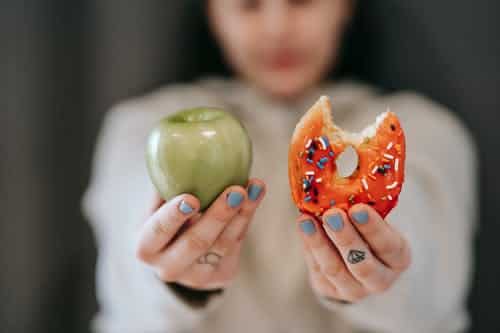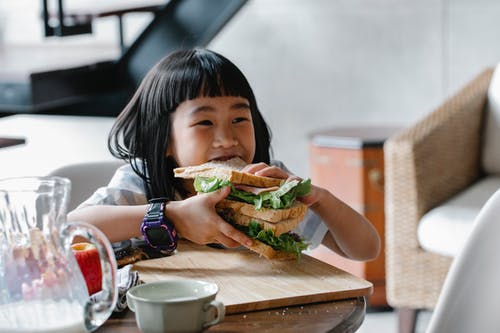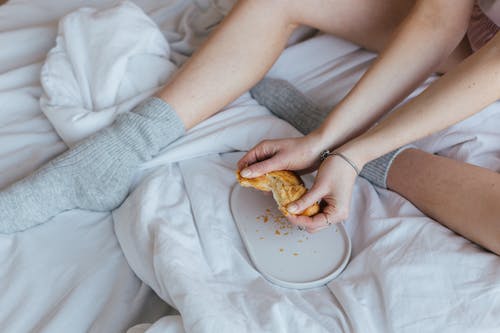Sometimes people ask me why I think I developed anorexia nervosa and how it is possible to have that degree of willpower to not eat (I am embarrassed to admit that I’ve even had people ask this as though it is a good thing, and they want in on the “secret”).
The truth is, entirely by accident.
I developed anorexia nervosa entirely by accident.
As, I can guarantee you, has every single other person who has ever developed an eating disorder in the history of the universe.
At no point in time did I decide I would starve myself or even deliberately try to eat less.
At no point in time did I consider that I would ever or was developing an eating disorder.
In every sense of the term, it just happened.
When I was diagnosed with anorexia nervosa at around 13 years old I had entirely no idea what that meant (and I suspect, looking back now nor did the doctor who diagnosed me or the procession of others I was to see in the years to come).
Having said this (that my “self-imposed starvation” was never a matter of willpower or intention) I’d like to share with you 3 things which likely contributed to my developing an eating disorder.
This is with the intention of first reiterating that an eating disorder is not a choice (yes, it’s frustrating that this is even something I have to say but you wouldn’t believe how many people are still treating eating disorders as though they are a choice – health care professionals included). And secondly, to perhaps allow you to identify some similarities between your story or the story of a loved one and mine so that you can address the areas that need addressing in order to heal from the eating disorder or ideally prevent the development of an eating disorder.
3 Factors Which Contributed to My Developing Anorexia Nervosa
- Minor Traumas

The purpose of my sharing this is not to list all the traumas which have happened to me and to “blame” them but rather I’ve chosen one incidence which is seemingly insignificant (and certainly objectivly trivial when compared to traumans I experienced later in life) with the purpose of highlighting that you don’t need to have experienced extreme levels of trauma, abuse, neglect and mistreatment to develop an eating disorder. Sometimes it just happens.
I want to share one seemingly innocuous experience I had in early childhood (and only consciously remembered many years later under hypnosis) which ended up having a monumental impact on my life and which I truly believe (whether I am right or wrong I’ll never know) was a major contributor to my developing anorexia nervosa.
When I was around 4 years of age my mum’s aunty died.
I was too young to understand and most likely too much effort to take to the funeral (I was quite a hyperactive child). My mum, older sister and I went to my grandparent’s place. I knew something wasn’t right and I was trying to stay close to my mum. I thought we were just visiting but when my mum snuck away with my older sister (with the absolute best of intentions) my little world was shattered.
I remember seeing the car drive away.
I remember feeling so lost and unsure of why they had “abandoned” me.
I remember feeling unsure if I’d ever see them again.
I remember feeling unsure of everything I’d ever known.
I believe at that point in time I developed the beginnings of, if not a full, belief that I wasn’t good enough.
I believe I developed a belief that I wasn’t worthy.
I believe I developed a belief that I wasn’t loved.
I believe I developed a belief that I wasn’t wanted.
These beliefs played out in all areas of my life at an unconscious level and affected the relationships and friendships I developed and as I said I believe contributed to my developing anorexia nervosa many years later because of how this one incident was interpreted by my child’s mind.
If I am to analyse this experience further there was food tied into the whole ordeal. After it was clear my mum and sister weren’t coming back (don’t worry they did come back after the funeral) I remember sitting quietly on my own. I remember my fear as I wondered if my mum and sister would ever come back to get me, if they wanted me… my grandma made me lemon pepper, cheese and tomato sandwiches and it was the first time I remember being utterly repulsed by the thought of eating. It was probably the first time I considered I wasn’t worthy of eating.
There are so many more traumas of various shapes and sizes I could add in here which have occurred both as a child and as an adult and which have affected me throughout my life but I truly believe this was one of the ones which had a large impact from a very early age and as I said I want you to know that the things which impact us as a 4 year old, a 2 year old, an 8 year old are not the same things which impact us as a 17 year old, a 24 year old, a 58 year old.
I want you to know it’s ok to know those things hurt you back then but please know at the same time that you couldn’t have done any different. Please know you did the best you could with what you knew at the time. It wasn’t your fault.
It’s also worth knowing that sometimes these things are stored at an unconscious level and guide your daily actions without your conscious awareness. As I mentioned this was my case. I didn’t remember this memory until I experienced hypnosis (it is an accurate memory because I’ve since spoken with both my mum and my sister about it. What was inaccurate was my interpretation – that I was unwanted). None of us were to know the outcome of that.
2. Bad Data (aka Acting on Dietary Misinformation)

There are so many points in time at which I was exposed to misinformation about what constituted “healthy” versus “unhealthy” eating that I cannot even begin to guess as to which ones impacted me, but for the purpose of providing examples for this post I am about to do so.
There are two incidences (or more accurately compilations of instances) which stand out in my mind as points in time where I firstly began to become aware of what I was eating and secondly began to change what I was eating.
The first was one day in primary school where I wanted to order some large number of mini homemade apple pies from the Tuckshop (school canteen) and my mum simply questioned if I indeed needed “so many.”
This was the first instance I remember doubting my body and feeling perhaps the beginnings of mistrust in my internal body signals to know how much I “should” or “shouldn’t” eat. It was the first time I’d questioned that there could conceivably be a “right” or “wrong” way to eat.
She was coming from a well-meaning place and to be honest I probably didn’t need to order whatever number of these pies I had decided upon… but that doesn’t matter. My child’s brain began to question if I could trust myself and it also began to tell me that I could get it wrong.
That I should look for the answer outside myself.
The second experience was when I went off to high school and entered Home Economic classes where we were taught being fat was the very worst thing you could be, told to eat low fat, try to eat as little as possible and mostly fruit and vegetables. I don’t really remember to be honest, but I do remember whatever I was told I did it.
I did it very well.
I did it too well.
I was a perfectionist.
If I had to say my eating disorder revolved around anything it was this pervasive desire to be “good”.
I was a straight A student so if a teacher told me to eat low fat, I was going to eat no fat. If a teacher told me to not eat too many processed foods, chocolates or lollies I was going to eat no processed foods, chocolates or lollies. If a teacher told me to not snack too much, I wasn’t going to snack at all. if a teacher told me to drink water with meals, I was going to drink 2L with each meal. If a teacher told me to eat mostly fruit and vegetables, I was going to eat only fruit and vegetables.
Good intentions acted upon bad data is the fastest, most sure fire (and likely most spectacular) way to fail.
I had the best of intentions and what I can see now was entirely incorrect data.
I became utterly confused over what I could and couldn’t eat until more often than not it became easier to just not eat.
It crossed the line from a naive well-intentioned choice into an impossibility to go against.
The eating disorder ruled my life.
The eating disorder was my life.
The eating disorder was me.
3. Lack of Self

You may be able to see that this one ties into the first two and is ultimately what was at the core of my developing as well as living with and being unable to recover from anorexia for almost 15 years.
At 4 years old I didn’t yet have a self-concept to say to myself “it’s ok my sister and my mum are just leaving me with my grandparents for a few hours because a funeral isn’t the place for a 4 year old, they love me and they will be back.”
At 9 years old I didn’t yet have a self-concept to say to my mum “actually I really do want those 5 apple pies and if it is too many and my body gets full, I know that I will stop eating them and it’s all ok. You can trust me. I can trust me”.
At 13 years old I didn’t yet have a self-concept to say to my teacher “I already eat well and won’t be changing what I eat as what I eat is not connected to my morality and worth as a human being”.
So, while at 25 years old I was trying with all my heart and soul to recover from anorexia nervosa something which, without question was destroying my life I didn’t yet have a self-concept to recover into.
There you have it a succinct series of events (obviously leaving out massive gaps) leading to a deep questioning of myself then onto an absolute lack of self which is arguably the perfect situation for an eating disorder to take the controls (because by that stage the control panel is wide open for the taking).
In fact, as I write this, it is honestly hitting me for the very first time that perhaps the eating disorder provided me with a surrogate sense of self!
Wow, that’s a thought.
The eating disorder was something tangible, it had rules which allowed me to easily make decisions of what I could and couldn’t do, it restricted my life in predictable ways and in a way, it gave me a sense of “self” that without I can see in hindsight I would have felt I’d have otherwise been left floating in an abyss because I hadn’t developed a sense of self.
A low sense of self is a key factor contributing to the development of an eating disorder. Therefore, if you find yourself with an eating disorder focusing on developing your sense of self is a key factor which will contribute immeasurably to your recovery from an eating disorder.
It is my belief that you cannot have both a rock-solid sense of self and an eating disorder because an eating disorder is only ever a means of coping in an otherwise terrifying and confusing (and bright, beautiful and wonderful) world.
Summary

I want to finish by quickly reiterating that these 3 factors I’ve mentioned above (trauma, dietary misinformation and lack of self-development) alone are not enough to “cause” an eating disorder.
There is solid evidence now that an eating disorder such as anorexia nervosa does require a genetic predisposition (for more information about this see my earlier blog “Anorexia Is Genetic: So What Do I Do Now?”)
I simply share these factors, which in hindsight I can speculate may have contributed to my developing anorexia nervosa (with full acceptance that I may be entirely incorrect, I will never truly know) to demonstrate 3 things.
There is no shame in expressing the things which hurt you. There is no shame in how you responded to them.
You did the best you could at the time with the information and skills you had. You always did and you always will.
The factors which contribute to the development of an eating disorder are vast and varied and unlikely the same between two people.
This is a minute sample of my story and by no means an exhaustive list of what I believe contributed to my developing anorexia nervosa. Yours will be entirely unique to you and some of what I’ve said may resonate with you and some of it may not in the slightest. Respect your experience.
That you can overcome whatever it is that makes it more likely for you to have an eating disorder than to not have an eating disorder.
You can beat the odds. You don’t have to, but you can.
I want you to know that recovery is always a possibility, not an inevitability but a possibility.
Final Thoughts

In truth my biggest encouragement to you if you are living with an eating disorder and are struggling to make meaningful changes in your life is to work with someone who works with the unconscious mind.
Honestly, your mind will be blown when you do and at the very least you’ll learn some interesting and useful things.
If you have a pretty solid knowledge foundation, you have your motivation and your why you want to make this change and you’ve tried to make changes and yet still haven’t been able to it is more than likely that the “problem” exists at an unconscious level. Therefore, going in and working directly at this level will save you so much time and unnecessary pain.
Working with the unconscious mind we can first overcome blocks that are holding you back, update your limiting beliefs to be in line with your values and install new skills and empowering, constructive beliefs so you can naturally move forward into doing life in a new way that works for you.
Clinical hypnotherapy is the fastest and most respectful therapy I have found for this means.
Give it a go.
Reach out to me and book an initial consult or I am more than happy to provide you with the names and contacts of people I know to be fantastic clinical hypnotherapists practicing throughout Australia, the world and online.
P.S

Finally, because I feel I placed a large emphasis on “self-concept” or “sense of self” as a key area to develop in order to make recovered your reality without saying how it is that you actually go about beginning to develop this, I want to finish by providing a few ways in which you can begin to address this. If you feel a low sense of self may be contributing to keeping you stuck in the gut wrenching and soul crushing cycle of eating disorder relapse after relapse after relapse. I am not a fan of being told you need to love yourself or just be more confident etc without some concrete means of actually going about doing this. So, to finish off here are a few very simple things you can begin today to steer you in the direction of who you want to be, who you can be and who you know you are inside.
- Simply begin to think about how you would have to feel in order to do the things you want to do (for example eat well, be healthy…)
- Begin to think about what you would have to believe about yourself and the world in order to do the things you want to do (for example eat well, be healthy…)
- Most of all begin to think about who you would have to be in order to do the things you want to do (for example eat well, be healthy…).
Then, practice.
Practice being that person now. Practice being that person now even if it is for very short periods of time (and if you truly can’t then please get help until you can).
In fact, get help until it becomes not just that you are pursuing freedom from pain but get the chance to move on to making your life fun, successful and fulfilling because I’ll let you in on a very hot tip it took me recovering from an eating disorder to recognise that life is about more than the overcoming, avoidance or ignoring of pain.
Life can be about experiencing, creating and enjoying (this does not negate the horrible things that may have happened to you and which happen daily throughout the world but you must at some point recognise that nor does your living in the shadows and outskirts of life in fear and pain).
I can only speculate as to the reasons I fell sick with anorexia nervosa and the reasons as to why I stayed sick (i.e. the purposes it came to serve) and at the end of the day it doesn’t particularly matter. What matters is the honest truth and that is that I endured almost 15 years of years of gut wrenchingly painful failed attempts at recovery because I simply didn’t know another way of being
The unsexy truth is I starved myself because I didn’t know I was starving myself.
The unsexy truth is I starved myself because I didn’t know any other way of doing things.
Therefore, what matters is the skills that you develop that allow for you to go on to live a life that no longer requires anorexia nervosa (insert any myriad of other things you may be doing but can’t stop in here) as a means of coping.
Let’s do that, now.
With my whole heart I hope you found this information useful and inspiring.

Become Great. Live Great.
Bonnie.



